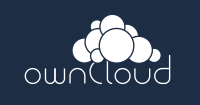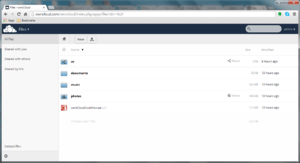ownCloud
 | |
|
ownCloud 7 web interface screenshot | |
| Developer(s) | ownCloud Inc.,[1] Community |
|---|---|
| Stable release | 8.0.2 / 11 March 2015[2] |
| Development status | Active |
| Written in | PHP, JavaScript |
| Operating system | Cross-platform |
| Type |
Online storage Data synchronization |
| Licence | AGPLv3 |
| Website |
owncloud |
ownCloud is a software system for what is commonly termed "file hosting". As such, ownCloud is functionally very similar to the widely used Dropbox, with the primary functional difference being that ownCloud is free and open-source, and thereby allowing anyone to install and operate it without charge on a private server, with no limits on storage space (except for disk capacity or account quota) or the number of connected clients. Despite the name, the software system does not use cloud computing unless it is manually configured (such as using Swift storage with load balancing, for example).
History
Frank Karlitschek, a KDE software developer, started developing ownCloud in January 2010, in order to provide a free software replacement to proprietary storage service providers.
ownCloud has been integrated with the GNOME desktop.[3] Integration of ownCloud with the Kolab groupware and collaboration project has started as of 2013.[4] Additional projects that use or link to ownCloud include a Raspberry Pi project to create a cloud storage system using the Raspberry Pi's small, low-energy form-factor.[5]
Design
In order for desktop machines to synchronize files with their ownCloud server, desktop clients are available for PCs running Windows, OS X, FreeBSD or Linux. Mobile clients exist for iOS and Android devices. Files and other data (such as calendars, contacts or bookmarks) can also be accessed using a web browser without any additional software. Any updates to files are pushed between all computers or mobile devices connected to a user's account.
The ownCloud server is written in the PHP and JavaScript scripting languages. For remote access, it employs sabre/dav, an open-source WebDAV server.[6] ownCloud is designed to work with several database management systems, including SQLite, MariaDB, MySQL, Oracle Database, and PostgreSQL.[7]
Features
- File storage in conventional directory structures or via WebDAV.
- Encryption of user files.
- Synchronization of clients running Windows (Windows XP, Vista, 7 and 8), Mac OS X (10.6 or later), or Linux.
- Calendar (also as CalDAV)
- Task scheduler.
- Address book (also as CardDAV)
- Music streaming (through Ampache)
- User and group administration (via OpenID or LDAP)
- Sharing of content across groups or public URLs.
- Online text editor with syntax highlighting and code folding
- Bookmarking
- URL shortening Suite
- Photo gallery.
- Video viewer.
- PDF viewer (using PDF.js)
- Viewer for ODF Files (.odt, .odp, .ods)
- Mozilla Sync hosting - If you are a Mozilla Firefox user, all history, form data, bookmarks etc. can be stored in your ownCloud server.
- RSS/Atom feed reader.
- Connecting external storages (If you have accounts on Dropbox, GoogleDrive, or Amazon S3, you can mount those storages into your ownCloud installation)
- Customizable with one-click-install apps.
- Logging Module: supports logging of file-related actions, logs, who accessed what, when and from where. (Only available in the ownCloud Business, Enterprise and Education Editions)
See also
- Comparison of file hosting services
- Comparison of file synchronization software
- Comparison of online backup services
References
- ↑ Official Company Website
- ↑ https://owncloud.org/changelog/
- ↑ "Integrate ownCloud in GNOME". gnome.org. Retrieved 1 January 2014.
- ↑ "ownCloud integration". kolab.org. Retrieved 1 January 2014.
- ↑ "Raspberry Pi Owncloud (Dropbox Clone)". raspberrypihelp.net. Retrieved 1 January 2014.
- ↑ "ownCloud and sabre/dav". owncloud.org. Retrieved 7 April 2015.
- ↑ http://doc.owncloud.org/server/7.0/admin_manual/configuration/database_configuration.html
External links
- Official website
- ownCloud at Github repository at GitHub
- OwnCloud at the Google Play store
- OwnCloud Android package at the F-Droid repository
- ownCloud Stack, a one-click installer at Bitnami
